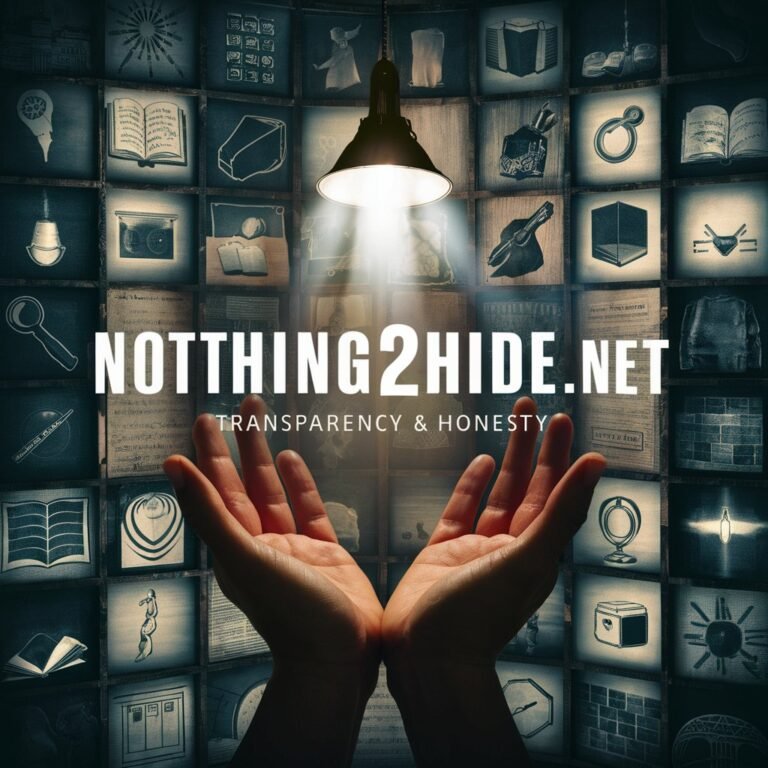In an era where data privacy and online security are major concerns, platforms that promote transparency and openness are becoming increasingly important. notthing2hide.net/ emerges as a concept that challenges the norms of secrecy, advocating for a more honest and accountable digital environment. Whether it’s about corporate ethics, personal data handling, or government surveillance, the idea of having “nothing to hide” sparks debates on privacy versus transparency. This article explores the different aspects of this philosophy, its implications, and why it matters in today’s interconnected world.
1. The Philosophy Behind “Nothing to Hide”
The phrase “nothing to hide” suggests that if individuals or organizations operate ethically, they should have no reason to conceal their actions. This perspective is often used in discussions about surveillance, data collection, and freedom of information. Advocates argue that transparency fosters trust, while critics warn that it can lead to privacy violations and misuse of personal data. The balance between these two viewpoints is delicate, and notthing2hide.net/ serves as a platform to explore these tensions.
2. Privacy vs. Transparency: A Modern Dilemma
One of the biggest challenges in the digital age is reconciling the right to privacy with the demand for transparency. While governments and corporations push for greater access to personal data in the name of security, many individuals fear overreach and loss of autonomy. The debate intensifies when considering whistleblowers, encrypted communications, and anonymous online activities. Does true transparency require sacrificing privacy, or can both coexist in a balanced framework?
3. The Role of Technology in Promoting Openness
Technological advancements have made it easier than ever to track, store, and analyze vast amounts of data. Blockchain, open-source software, and public audits are some tools that enhance transparency. However, the same technologies can also be weaponized for mass surveillance. notthing2hide.net/ could serve as a hub for discussing how technology can be used ethically—whether through secure platforms that protect user anonymity while ensuring accountability or systems that allow public scrutiny without exploitation.
4. Corporate and Government Accountability
Many scandals in recent years—from data leaks to unethical business practices—have highlighted the need for greater accountability. If companies and governments truly have nothing to hide, they should willingly disclose their operations. Yet, secrecy often persists under the guise of confidentiality or national security. This section examines case studies where transparency led to positive change and instances where opacity resulted in public distrust.
5. The Psychological Impact of Living with “Nothing to Hide”
Beyond legal and ethical considerations, the idea of constant visibility affects human behavior. Studies show that people alter their actions when they know they’re being watched, a phenomenon known as the panopticon effect. While this can deter misconduct, it may also stifle free expression and creativity. How does society navigate the psychological consequences of a world where privacy is diminished in favor of total transparency?
6. How notthing2hide.net/ Can Drive Change
A platform like notthing2hide.net/ has the potential to educate, advocate, and influence policies on transparency. By hosting discussions, providing resources, and showcasing real-world examples, it can encourage individuals and institutions to adopt more open practices. Whether through investigative journalism, community forums, or policy recommendations, the website could become a key player in shaping a more accountable digital future.
Conclusion: Striking the Right Balance
The concept of notthing2hide.net/ is more than just a slogan—it’s a call to rethink how society values privacy and transparency. While complete openness may seem ideal, the risks of abuse and loss of personal freedom cannot be ignored. The challenge lies in creating systems that ensure accountability without compromising individual rights. As technology evolves, so must the conversation around what it truly means to have “nothing to hide.”

